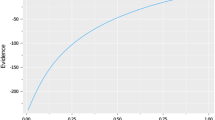Abstract
Often, we only have partial knowledge about a probability distribution, and we would like to select a single probability distribution \(\rho (x)\) out of all probability distributions which are consistent with the available knowledge. One way to make this selection is to take into account that usually, the values x of the corresponding quantity are also known only with some accuracy. It is therefore desirable to select a distribution which is the most robust—in the sense the x-inaccuracy leads to the smallest possible inaccuracy in the resulting probabilities. In this paper, we describe the corresponding most robust probability distributions, and we show that the use of resulting probability distributions has an additional advantage: it makes related computations easier and faster.
Access this chapter
Tax calculation will be finalised at checkout
Purchases are for personal use only
Similar content being viewed by others
References
Azzalini A, Capitanio A (2013) The Skew-Normal and Related Families. Cambridge University Press, Cambridge, Massachusetts
Fishburn PC (1969) Utility Theory for Decision Making. Wiley, New York
Jaynes ET, Bretthorst GL (2003) Probability theory: the logic of science. Cambridge University Press, Cambridge
Klir G, Yuan B (1995) Fuzzy sets and fuzzy logic. Prentice Hall, Upper Saddle River
Kreinovich V, Kosheleva O, Nguyen HT, Sriboonchitta S (2016) Why some families of probability distributions are practically efficient: a symmetry-based explanation. In: Huynh VN, Kreinovich V, Sriboonchitta S (eds) Causal inference in econometrics. Springer, Cham, pp 133–152
Luce RD, Raiffa R (1989) Games and decisions: introduction and critical survey. Dover, New York
Nguyen HT, Kosheleva O, Kreinovich V (2009) Decision making beyond Arrow’s ‘impossibility theorem’, with the analysis of effects of collusion and mutual attraction. Int J Intell Syst 24(1):27–47
Nguyen HT, Kreinovich V, Lea B, Tolbert D (1992) How to control if even experts are not sure: robust fuzzy control. In: Proceedings of the second international workshop on industrial applications of fuzzy control and intelligent systems, College Station, Texas, 2–4 December 1992, pp 153–162
Nguyen HT, Kreinovich V, Tolbert D (1993) On robustness of fuzzy logics. In: Proceedings of the 1993 IEEE international conference on fuzzy systems FUZZ-IEEE’93, San Francisco, California, March 1993, vol 1, pp 543–547
Nguyen HT, Kreinovich V, Tolbert D (1994) A measure of average sensitivity for fuzzy logics. Int J Uncertainty Fuzziness Knowl Based Syst 2(4):361–375
Nguyen HT, Walker EA (2006) A first course in fuzzy logic. Chapman and Hall/CRC, Boca Raton, Florida
Novitskii PV, Zograph IA (1991) Estimating the measurement errors. Energoatomizdat, Leningrad (in Russian)
Rabinovich SG (2005) Measurement errors and uncertainty. Theory and practice. Springer, Berlin
Raiffa H (1970) Decision analysis. Addison-Wesley, Reading
Sheskin DJ (2011) Handbook of parametric and nonparametric statistical procedures. Chapman & Hall/CRC, Boca Raton, Florida
Zadeh LA (1965) Fuzzy sets. Inf Control 8:338–353
Acknowledgements
We acknowledge the partial support of the Center of Excellence in Econometrics, Faculty of Economics, Chiang Mai University, Thailand. This work was also supported in part by the National Science Foundation grants HRD-0734825 and HRD-1242122 (Cyber-ShARE Center of Excellence) and DUE-0926721, and by an award “UTEP and Prudential Actuarial Science Academy and Pipeline Initiative” from Prudential Foundation.
Author information
Authors and Affiliations
Corresponding author
Editor information
Editors and Affiliations
Rights and permissions
Copyright information
© 2017 Springer International Publishing AG
About this chapter
Cite this chapter
Sriboonchitta, S., Nguyen, H.T., Kreinovich, V., Kosheleva, O. (2017). Robustness as a Criterion for Selecting a Probability Distribution Under Uncertainty. In: Kreinovich, V., Sriboonchitta, S., Huynh, VN. (eds) Robustness in Econometrics. Studies in Computational Intelligence, vol 692. Springer, Cham. https://doi.org/10.1007/978-3-319-50742-2_3
Download citation
DOI: https://doi.org/10.1007/978-3-319-50742-2_3
Published:
Publisher Name: Springer, Cham
Print ISBN: 978-3-319-50741-5
Online ISBN: 978-3-319-50742-2
eBook Packages: EngineeringEngineering (R0)




